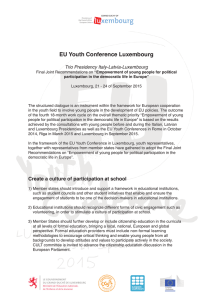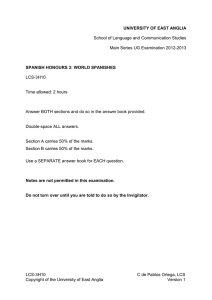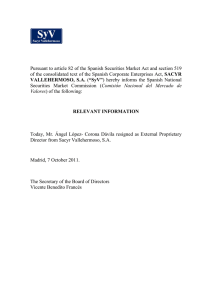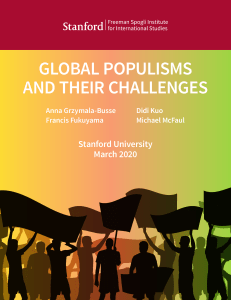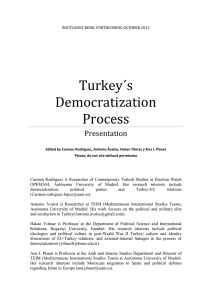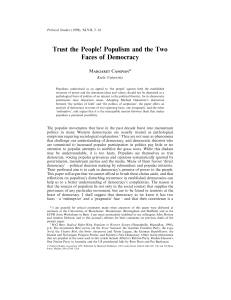Party Law in Comparative Perspective
Anuncio
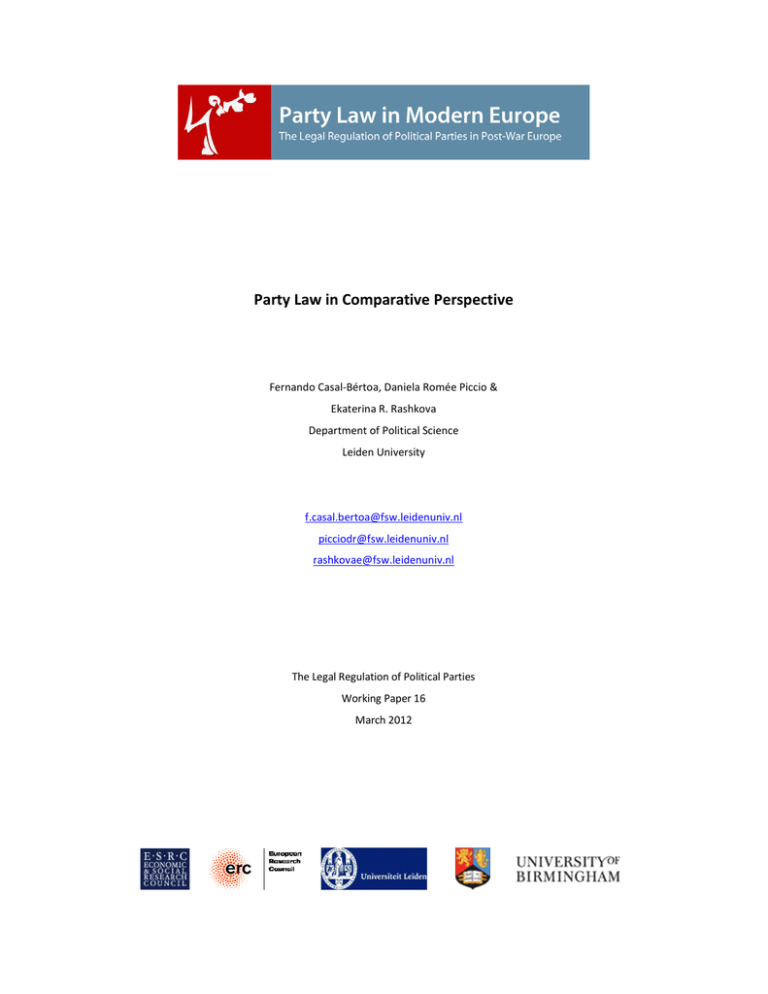
Party Law in Comparative Perspective Fernando Casal-Bértoa, Daniela Romée Piccio & Ekaterina R. Rashkova Department of Political Science Leiden University [email protected] [email protected] [email protected] The Legal Regulation of Political Parties Working Paper 16 March 2012 © The author(s), 2012 This working paper series is supported by the Economic and Social Research Council (ESRC research grant RES-061-25-0080) and the European Research Council (ERC starting grant 205660). To cite this paper: Casal-Bértoa, Fernando, Piccio, Daniela Romée, Rashkova, Ekaterina (2012). ‘Party Law in Comparative Perspective’, Working Paper Series on the Legal Regulation of Political Parties, No. 16. To link to this paper: http://www.partylaw.leidenuniv.nl/uploads/wp1612.pdf This paper may be used for research, teaching and private study purposes. Any substantial or systematic reproduction, re-distribution, re-selling, loan or sub-licensing, systematic supply or distribution in any form to anyone is expressly forbidden. ISSN: 2211-1034 The Legal Regulation of Political Parties, working paper 16/12 Party Law in Comparative Perspective Introduction Political parties have become increasingly subject to laws in the recent years. The liberal principle of non intervention in political parties’ internal matters that prevailed across the European continent since the very emergence of political parties as organizations seems no longer to be the dominant paradigm. The several guidelines adopted by the European Commission for Democracy through Law (‘Venice Commission’) and directed to state actors, although not mandatory, offer a clear indication of the degree to which greater intervention in the political parties’ affairs is currently being claimed for. According to the recently adopted ‘guidelines on political party regulation’ issued in October 2010, “basic tenets of a democratic society, as well as recognized human rights, allow for the development of some common principles applicable to any legal system for the regulation of political parties”.1 Not only the regulation of political parties in Europe overall increased, but the Europe is witnessing a proliferation of specific Laws on Political Parties or Party Laws. Yet, despite the increased state regulation of the life and statute of the political party, relatively little comparative attention has been given to the development of this phenomenon. As Janda observes, “there are not many systematic cross-national surveys of party law” (Janda, 2005, 6 and 2006b). Indeed, except some references to the regulation of the establishment of political parties, works studying political parties and the dynamics of party systems say little about the most obvious and direct manner through which the life and existence of a political party is regulated through legislation. Müller and Sieberer (2006, 435) accurately note that party law has been the domain of academic lawyers and “political scientists, while interested in the substance of party regulation in some selected fields, in particular with regard to election and party finance, have not devoted much attention to party law as such”. We argue that the proliferation of Party Laws across Europe (i) is an important phenomenon per se; (ii) bears important normative implication concerning the position that political parties have acquired in modern representative democracies; 1 ‘Guidelines on political party regulation’, by OSCE/ODIHR and Venice Commission, 25 October 2010 (Study no. 595/2010), p. 6. See, http://www.venice.coe.int/docs/2010/CDL-AD(2010)024-e.pdf. 1 Bértoa, Piccio & Rashkova: Party Law in Comparative Perspective and also (iii) has the potential to affect the organizational development of political parties and of party systems. First, it is the role of political parties as main vehicles of democracy (Schattschneider, 1942) and their centrality with respect to political representation (Sartori, 1976) that, alone, warrants the study of the rules governing party establishment and party life. Additionally, Party Laws contain regulations on a variety of aspects of party organizations, varying from their definition, composition, structure, programme and activities to specific rules about party finance and external control over their activities. The proliferation of such rules has been observed in the light of an increasing intervention of the state in internal party matters, which undermines the fundamental nature of political parties as voluntary organizations transforming them into ‘public utilities’ (van Biezen, 2004). Another reason justifying the interest in the study of party regulation in the Party Law is that often rules specified in, but not limited to, the Party Law affect the format and the functioning of party systems, such as for instance they determine whether or not we see few or many new political entrants (van Biezen and Rashkova, 2011) and affect the nature of the competition and competitors (see chapter 8 in this book on Ethnic Parties). Finally, as we will discuss in this chapter, there exist differences and similarities in the regulation of parties both among states and across time. Thus, by tracing the variation in the constraints and benefits that parties are subjected to, we offer a useful departure base for studies interested in the examination of the causes and consequences of legal regulation, or their effects on party competition, electoral developments, and policy enactment. This chapter provides an overview of party regulation in the Party Laws of post-war European democracies. Building on previous work studying the constitutional regulation of political parties, a rich and original dataset of party laws has been collected under the Re-conceptualizing Party Democracy project.2 The chapter explores the temporal pattern of promulgation of Party Laws, their main regulatory focus, and shows how regulation through Party Laws differs over time and across countries. In doing so, it presents an overview of the party law content offering a quantitative overview of the range and magnitude of party regulation, thus depicting trends on the change of regulation over time, insight into what aspects of the life of 2 Re-conceptualizing Party Democracy is a project directed by Prof. Ingrid van Biezen and funded by the European Research Council (ERC). More information to be found at www.partylaw.leidenuniv.nl. 2 The Legal Regulation of Political Parties, working paper 16/12 political parties are regulated most heavily and most often, as well as an analysis of whether significant differences in the evolution of regulation between different groups of countries, exist. The final part of the chapter supplements the quantitative examination of party regulation with a qualitative case study on the party law of Spain. Drawing on Karvonen’s seminal study (2007), the Spanish Party Law is analyzed emphasizing three distinct categories believed to have a substantive effect on the life of a party. These are party bans, registration and membership requirements, as well as judicial, legal or administrative sanctions. There, and notwithstanding the special concern of the Spanish legislator with terrorism, we find, like in most European countries, a rather open system of party registration; a prototype of what a party statute should contain which, as in most democracies, tend to be minimal; and, last but not least, both a governmental (preventive) and judicial (successive) control on political parties. The chapter concludes with a summary of the presented data and a discussion of potential research directions in the future. 1. The proliferation of Party Laws across Europe Before describing the temporal pattern of regulation of political parties through Party Laws across Europe it is essential to provide a definition of Party Law. Indeed, as Janda remarked, “the term ‘party law’ is nebulous” (Janda, 2006b, 2).3 Scholars have defined ‘party law’ as “the total body of law that affect political parties” (Müller and Sieberer, 2006, 436), therefore indicating by this term all state rules governing, or having an effect on, political parties as organizations. Indeed, state regulation of political parties may originate in different bodies of law, such as Electoral Laws, Campaign Laws, Political Finance Laws, Party Laws, as well as in Media Laws, Laws on Civil Association, national Constitutions, administrative rulings, legislative statutes, and (constitutional) court decisions (see Janda, 2005 and 2006b; van Biezen, forthcoming). As the core focus of this research is concerned with the legal regulation specifically directed at political parties as organizations, in this chapter we define Party Laws (PLs) as those laws which make a textual reference to political parties in their title (e.g. Law on Political Parties, Party Law). Laws that are not limited in this 3 Elsewhere Janda argued: “[t]he term ‘party law’ has different meanings to different people, even among party scholars” (Janda 2005, 3). 3 Bértoa, Piccio & Rashkova: Party Law in Comparative Perspective regard – such as laws on political associations more generally, electoral laws, or laws on party finance – are not considered in this analysis, even though, as described above, they may also apply to political parties. Hence, legal documents which refer to, but are not exclusively devoted to political parties, are not included in our definition. Out of the thirty-three countries included in the Re-conceptualizing Party Democracy project, consisting of the independent and democratic European states in the post-war period (1944-2010), twenty adopted a Party Law: Austria, Bulgaria, Croatia, Czech Republic, Estonia, Finland, Germany, Hungary, Latvia, Lithuania, Norway, Poland, Portugal, Romania, Serbia, Slovakia, Slovenia, Spain, Ukraine, and the United Kingdom.4 Figure 1 provides an overview of the establishment of regulation of political parties through Party Laws in European democracies, listing for each country the year in which Party Laws were first approved.5 Figure 1. The Adoption of Party Laws in Post-War Europe Romania - 1996 Spain - 1978 Serbia - 2009 Lithuania - 1995 Estonia, Slovenia - 1994 Latvia - 2006 Norway - 2005 Portugal - 1974 Czech Republic, Slovakia, Croatia - 1993 Austria - 1975 Finland - 1969 Ukraine - 2001 Bulgaria, Poland - 1990 Germany - 1967 1965 1970 Hungary - 1989 1975 1980 1985 1990 1995 United Kingdom - 1998 2000 2005 2010 Figure 1 shows how the process of party regulation through Party Laws started with the establishment of the German Party Law in 1967. However, although Germany has been considered as “the heartland of Party Law” (Müller and Sieberer, 2005, 435), it is important to note here that the German Parteiengesetz was not the first, neither in the world nor even in Europe (Karvonen, 2007, 451-453). That honor belongs, respectively, to the Venezuelan Ley de Partidos Políticos, Reuniones Públicas and Manifestaciones (1964) and the Siyasî Partiler Kanunu passed by the 4 A list with the legal reference to the laws included in our sample is presented in Appendix. More recently (i.e. March 2011), also Cyprus promulgated a “Law on Political Parties”, even if it mainly contains funding regulations. For this reason, but also due to its recent adoption, we do not include it in the analysis. 5 4 The Legal Regulation of Political Parties, working paper 16/12 Turkish Grand National Assembly on June 1965.6 Still, it was only after the promulgation of the German Law on Political Parties on July, 24th 1967 that this type of legislation began to proliferate in the continent. In other words, it was not the Venezuelan or the Turkish Party Laws but the German Act which, bearer of the most comprehensive and detailed regulation, became a model to follow for many national laws on political parties, particularly in the newly created European democracies (Müller and Sieberer, 2006, 438; Kasapovic, 2001 7). Similarly to what others have observed in relation to the “party constitutionalization” phenomenon (van Biezen, forthcoming, 11-13), in the process of Party Law promulgation it is possible to distinguish three different phases. In this context, Germany, Finland, but also Austria – three countries which democratized during the first half of the XXth century – would be part of the first wave of party regulation. Even if the latter two differ from the first one in length as well as in the detail of regulation in the parties’ internal organizational structure,7 all of them respond to the necessity of regulating the public finance of political parties, granted at the same time (e.g. Austria and Finland) or just a couple of years before the establishment of the Party Law (1959 in the case of Germany) (Piccio 2012, forthcoming). A second wave of party law-making coincides with the beginning of Huntington’s ‘Third Wave’, clustering together both Portugal and Spain. Contrary to what could be observed in the previous ‘wave of party regulation’, these laws have a different political background. Here the main aim is not so much the regulation of public funding of political parties, which was introduced at a later stage,8 but the necessity to control the creation and activity of the parties which start to proliferate in the new democratic environment. Indeed, as we will underline in the next sections of this chapter, in both Portugal and Spain the bulk of provisions contained in these first laws deals with the regulation of political parties as organizations per se. 6 It should be noted, however, that the Turkish Party Law was passed on the basis of art. 57 of the 1961 Constitution which, in turn, was “inspired by art. 21 of the [1949] Constitution of the Federal German Republic” (Dodd, 1969, 130). 7 Both the Austrian and the Finish laws are characterized by their lower degree of regulation as compared to the German Law on Political Parties, in particular for what the internal organization of political parties is concerned. 8 State subsidies in order to fund the activity of political parties were only introduced in Portugal in 1977 and eight years later in Spain. Moreover, both countries shared a legalistic culture where party funding is regulated in a different piece of legislation. 5 Bértoa, Piccio & Rashkova: Party Law in Comparative Perspective The third wave of post-war party regulation is strictly connected with the fall of communism in Eastern Europe in the early 90s. In this sense, it acutely coincides with what some have named the “Fourth Wave of democratization” (McFaul, 2002). Indeed, the interconnection between these two waves is so straightforward that no East European democracy has remained unaffected by such regulatory process since the pass of the first Party Law, in Hungary in 1989. Moreover, in most cases the laws regulating political parties were introduced in the years immediately following the democratic transition.9 In any case, and with very few exceptions, all these laws, modeled on the German Party Law, have brought together in a single legal document each of the goals examined above: namely, the regulation of both party funding and party organization. As shown later in table 1, East European countries have been more inclined to regulate political parties than earlier democratizers. One reason for this may be the lack of confidence of the legislator on the process of democratic consolidation. All in all, the Party Laws adopted in Europe after 1989 have all been enacted in Eastern European countries, with the sole exception of the United Kingdom and Norway. Differently from the Party Laws enacted in Eastern Europe, the UK and the Norwegian Party Laws do not include provisions on party organization, but they were rather designed to provide a regulatory system for party registration (UK), and for the regulation of party finance (Norway).10 2. The content of Party Laws In the preceding paragraph we presented the evolution in the establishment of Party Laws across Europe. But what are Party Laws about, and which specific aspects of party organizations do they regulate? Previous research has underlined how Party Laws serve a number of basic purposes: to determine who is entitled to be recognized as a political party; to regulate the forms of activity in which political parties may engage; and to regulate the forms of internal organization and political behavior that are acceptable for political parties (Katz, 2004, 2-3). Karvonen included the establishment of sanctions as further analytical dimension of party regulation (Karvonen, 2007). 9 In this particular aspect, the only exceptions are Latvia and, to a lesser extent, Serbia, where Party Laws were, respectively, approved only twelve and nine years after the beginning of democracy. 10 The same applies also for the case of the recently established Party Law of Cyprus, whose main regulatory focus is upon party finance regulation (see ft. 5. 6 The Legal Regulation of Political Parties, working paper 16/12 In order to make sense of the vast scope of rules which lay in the Party Laws, we used the analytical framework first developed in The Constitutional Regulation of Political Parties in Post-War Europe project. Similarly to the analysis of Constitutions, the content of Party Laws is examined with respect to twelve main domains of party regulation: (1) democratic principles; (2) rights and freedoms; (3) extra-parliamentary party; (4) electoral party; (5) parliamentary party; (6) governmental party; (7) activity and behavior; (8) identity and program; (9) party finance; (10) media access; (11) external oversight; and (12) secondary legislation. Democratic principles and rights and freedoms include references which define political parties in terms of key democratic principles and values or which associate parties with fundamental democratic rights and liberties. For example, a discussion of principles such as competition and equality or mention of democratic values like pluralism, participation, popular will, and representation is coded under those two categories. The Party Law of Lithuania, for instance, stipulates that “political parties shall […] assist in shaping and expressing the interests and political will of the citizens of the Republic of Lithuania” (Law on Political Parties and Organizations, art. 1) and they shall “enjoy the right to freely disseminate information in written, verbal, or any other way in their activities” (Ibidem, art. 18.1). The organization of parties is subdivided into four categories each dealing with regulations of the party in its specific role - the party outside, the party in the electoral arena, the party in parliament, and the party in government. The extra-parliamentary category includes provisions regulating the internal operational structure of political parties. Among these are regulations devoted to the internal democracy of political parties, which refer to elections of party bodies, their accountability, the resolution of party conflict and procedures for nominations to public office, to name a few. The German Party Law, for example, stipulates that “Party members and delegates in the party bodies shall have equal voting rights” (The Law on Political Parties, art. 10.2). Reflecting the fact that most states have party law provisions about party membership, one of the main components of the extra-parliamentary party category denotes rules on the compatibility of party membership with the membership or activity in other elected offices, the civil service, the judiciary, trade unions, or other public office. The extra-parliamentary party category further includes references to the organization structure and the legal status and registration requirements of political parties. Electoral rules, campaign activity and rules on fielding candidates are part of the 7 Bértoa, Piccio & Rashkova: Party Law in Comparative Perspective second subcategory in the organizational structure of parties entitled the electoral party. This category generally reflects references to the party in competition. The behavior of parties in parliament in reference to regional and local legislature, the participation in parliamentary committees, staffing, and policy formation are subject of the parliamentary party category. Here, all legal references to the conduct of the party in parliament are coded. Lastly, we have a category dealing with the governmental party which includes references on how national, regional and local executive are to be composed. Under the activity and identity category, the coding scheme registers provisions aimed at restricting or prohibiting certain forms of behavior or certain ideological foundations of political parties. Many laws contain conditions regarding the respect of human rights, the prohibition of the use of violence, the spreading of hatred or the use of non-democratic methods by political parties. The Party Law of Spain offers an example of the latter as it prohibits political parties whose actions “univocally show a track record of breakdown of democracy and offence against the constitutional values” (Law on Political Parties, Preamble). Some states go as far as to prohibit the formation of political parties on ethnic, nationalistic or religious grounds. Indeed, the only country within our dataset to ban parties on ethnic grounds is Bulgaria (for more details, see chapter 8). In some cases, while parties are not banned because of identity reasons, stringent rules that forbid political parties to accept donations from religious institutions, humanitarian or similar organizations, exist. For instance, while the Bulgarian Party Law stipulates that “political parties shall not receive funds from anonymous donations, legal persons, religious institutions and foreign governments” (2009, Article 24), Slovenia not only does not allow parties to be funded by “state and local community authorities, entities governed by public law, humanitarian organizations, religious communities…” (2007, Art. 25) but it also imposes “a fine of €4150 to €20850 […] upon entities governed by public law, humanitarian organizations, religious communities […] if they finance a party” (2007, Art. 29). Such stipulations are part of the party finance category. Due to the large amount of financial matters pertaining to political parties, the latter is subdivided into five further sub-categories. These are direct public funding, indirect public funding, private funding, regulation of expenditures, and reporting and disclosure. Naturally, the first two include rules about the amount, allocation and use of public funding, while the latter three focus on limits, transparency, and use of private funding, as well as on 8 The Legal Regulation of Political Parties, working paper 16/12 rules of disclosure of funding and expenditures overall. A large part of the lawfulness of party activity is to be monitored by external institutions, such as a supervising authority or a system of sanctions. Provisions related to the type of monitoring and how parties are to be monitored are part of the external oversight category. An example of a clause falling in this category is the stipulation in the Polish Party Law that “[e]xamination of cases for ascertainment of non-compliance of the purposes and activities of political parties with the Constitution shall fall within the competence of the Constitutional Tribunal (Act on Political Parties, Art. 42). Lastly, regulations pertaining to further legislation applying to political parties and provisions about the use of media by political parties are part of the secondary legislation and the media access categories, respectively. The latter consists mostly of allocation and restriction mechanisms for the use of public and private media during electoral and non-electoral periods. Data analysis In order to quantify the extent to which different laws regulate specific domains, each Party Law was coded and analyzed for references to the twelve dimensions of party regulation described above. How is regulation distributed along those categories? To give a preliminary answer to this question, table 1 presents a comparative overview of the magnitude of regulation of political parties that exists in Party Laws. The top row lists the categories across which the coding of regulation is done. Table 1 includes the twenty European democracies which have adopted a Party Law. Each cell represents the amount a country regulates a specific category in relation to the regulation in its entire party law (in percent), while in parenthesis we show the ‘raw count’ of regulation depicting the number of instances a country’s law mentions the category in question. So for example, 24.1 per cent of the Czech Republic party law is devoted to the regulation of the extra-parliamentary category, with 39 unique counts of mentions of the internal procedures, membership organization or the organizational structure of the party (all part of the overarching extra-parliamentary category). In total, when we sum all raw counts presented in the parenthesis horizontally, the magnitude of regulation in the Czech party law amounts to 162. This means that 162 unique mentions of characteristics included under our twelve broad 9 Bértoa, Piccio & Rashkova: Party Law in Comparative Perspective categories were found within the law. To put the figure in comparative perspective, the magnitude of the United Kingdom’s party law adds up to a mere 69 mentions. Finland ranks even lower with a magnitude of 50, while Germany, the country where party regulation originated, reportedly exhibits the highest number of regulation instances summing to 304 altogether. To ease the comparison between countries, the category in which a country regulates most heavily in is shown in bold. We see that Austria and Bulgaria, for example, regulate most heavily in the party finance category, while Croatia, Estonia, and Germany, among others, put their regulatory efforts into the extra-parliamentary category. The UK, Poland and Estonia, on the other hand, spend half or nearly half of their regulatory attempts in controlling the external oversight of parties. Another observation that comes out of the data presented in the table is that the extraparliamentary category is regulated most heavily in the largest number of cases. We see that 10 states devote most of the regulation in their party law to this category. Interestingly, 8 of the 10 states which regulate the extra-parliamentary party most heavily are post-communist democracies. Considering that the extra-parliamentary category contains regulation about registration rules and requirements which guide the establishment, existence, and competition of political parties, this is not surprising as we know that a lot of rules attempting to battle the often high party system fractionalization in those countries have been introduced in the recent years. For example, the number of citizens which are required to register a political party, which is part of the extra-parliamentary party category, varies greatly among countries. According to art. 7 (1990) and art. 10 (2009) of the Bulgarian Party Law, “a political party shall be established at a constituent assembly by the agreement of at least 50 citizens with voting rights.” In Croatia, the requirement is 100 adults (art. 6, 1999), while in Estonia “a political party shall be registered if it has at least 1000 members (art. 6, 1994).” The second most heavily regulated category, according to the data in table 1, is the external oversight category - it is the most regulated category in seven countries from our sample. What draws attention is the observation that the regulation of the external oversight category is regulated more than party finance. The latter is the most regulated category in only four countries – Austria, Bulgaria, Hungary, and Norway. This makes sense when we look at the type of regulations which go into the external oversight category. It consists of regulations related to the external monitoring of the 10 The Legal Regulation of Political Parties, working paper 16/12 lawfulness of party activity, party organization, party finance, as well as penalties and sanctions against prohibited matters. In the Austrian law for instance, we find a clause asking political parties to “keep strict accounting of the use of the subsidies in accordance with their designation […]. In addition, each political party receiving subsidies […] reports publicly the type of its income and expenses” (art. 4, 1975; 2003). Estonia, one of the few countries which take political parties off the registry if they fail to get representation in two consecutive elections, forbids political parties to register under the name of existent or deleted parties in the party registry (art. 9, 2010). The high regulation of this category is hardly surprising, given the efforts of the European Union to increase transparency of political parties in an attempt to better combat corruption. Related to this is the adoption of special Party Finance Laws in many European states, where matters of control, transparency, and accountability of the financing of parties is dealt with directly. Finally, we see that the two least regulated categories are those dealing with the parliamentary party and the government party. In fact, Latvia, Estonia and Romania are the only states which devote some attention to these categories in their party laws. One explanation for the lack of regulation in those two categories is that rules applying to parliamentary groups and to the party in government are specified elsewhere (for example in the rules of parliamentary procedure, the electoral law, or the Constitution) and thus are not part of the Party Law per se. Another manner of comparison of regulation among countries is the range of regulation. Although not reported directly in the table shown here, one can tell the range by looking at how many of the twelve broad categories a country regulates. To continue the example of the Czech Republic, we see that according to our coding the Czech party law has a range of 8. This is a relatively high range in comparison to the UK and Norway which only have a range of 5. The highest range achieved by any given country in our sample is that of Portugal. Portugal regulates in all but two categories.11 11 For an in-depth diachronic (content) analysis of the Portuguese case, see Casal Bértoa (forthcoming). 11 Bértoa, Piccio & Rashkova: Party Law in Comparative Perspective Table 1. Dimensions of party regulation by country (%)* Electoral party Parliament party Government party Activity & behaviour Identity & programme Media access Party finance External oversight Secondary legislation 2.2 (2) 0.4 (1) 0.9 (1) Extraparliament party 4.4 (4) 20.9 (53) 39.4 (43) 0.0 (0) 0.0 (0) 0.0 (0) 0.0 (0) 0.0 (0) 0.0 (0) 0.0 (0) 0.0 (0) 0.0 (0) 0.0 (0) 2.0 (5) 2.8 (3) 0.0 (0) 0.0 (0) 0.0 (0) 2.2 (2) 0.0 (0) 0.0 (0) 47.8 (43) 36.0 (91) 17.4 (19) 34.4 (31) 29.6 (75) 33.9 (37) 6.7 (6) 9.9 (25) 4.6 (5) 1.2 (2) 1.0 (1) 0.0 (0) 24.1 (39) 35.7 (35) 22.0 (11) 0.0 (0) 2.0 (2) 0.0 (0) 0.0 (0) 0.0 (0) 0.0 (0) 0.0 (0) 0.0 (0) 2.0 (2) 0.0 (0) 0.0 (0) 2.5 (4) 5.1 (5) 2.0 (1) 0.0 (0) 0.6 (1) 0.0 (0) 0.0 (0) 0.0 (0) 0.0 (0) 0.0 (0) 37.0 (60) 21.4 (21) 44.0 (22) 6.2 (10) 9.2 (9) 8.0 (4) 0.3 (1) 0.0 (0) 7.3 (6) 2.7 (5) 0.0 (0) 1.8 (4) 4.0 (4) 2.2 (4) 0.0 (0) 0.5 (1) 0.0 (0) 5.5 (7) 6.3 (8) 0.0 (0) 0.0 (0) 3.7 (3) 0.0 (0) 0.0 (0) 0.9 (2) 2.0 (2) 0.0 (0) 0.0 (0) 0.0 (0) 0.0 (0) 0.0 (0) 2.4 (3) 27.8 (45) 22.4 (22) 24.0 (12) 36.2 (110) 46.3 (38) 2.4 (2) 4.3 (8) 38.0 (35) 24.4 (55) 2.0 (2) 0.0 (0) 1.4 (2) 27.6 (58) 29.3 (43) 0.0 (0) 6.3 (8) 20.1 (61) 28.0 (23) 11.0 (9) 28.9 (54) 38.0 (35) 45.3 (102) 18.8 (19) 31.1 (56) 34.3 (49) 37.6 (79) 32.0 (47) 38.3 (49) 24.6 (31) 2.6 (8) 8.5 (7) 9.8 (8) 6.4 (12) 5.4 (5) 8.4 (19) 5.9 (6) 4.4 (8) 4.2 (6) 4.3 (9) 2.0 (3) 7.0 (9) 8.7 (11) 0.0 (0) 2.9 (2) 0.0 (0) 58.0 (40) 11.6 (8) 41 14 593 900 178 2.1 0.7 29.7 45 8.9 10 6 17 20 20 Country / Category Democratic principles Rights & freedoms Austria Bulgaria Croatia Czech Republic Estonia Finland Germany 2.2 (2) 1.2 (3) 0.9 (1) 0.6 (1) 1.0 (1) 0.0 (0) 2.0 (6) 0.0 (0) 1.0 (3) 37.8 (115) Hungary 3.7 (3) 1.2 (1) 12.2 (10) 0.0 (0) 0.0 (0) 0.0 (0) 0.0 (0) Lithuania 4.9 (4) 6.1 (5) 0.0 (0) 0.0 (0) 0.0 (0) 7.3 (6) 47.6 (39) Latvia 0.5 (1) 0.0 (0) 1.6 (3) 1.1 (2) 0.0 (0) 1.6 (3) 52.9 (99) Norway 0.0 (0) 0.0 (0) 17.4 (16) 1.1 (1) 0.0 (0) 0.0 (0) 0.0 (0) Poland 0.4 (1) 0.4 (1) 16.4 (37) 0.0 (0) 0.0 (0) 0.0 (0) 1.8 (4) Portugal 5.0 (5) 3.0 (3) 2.0 (2) 0.0 (0) 0.0 (0) 5.0 (5) 52.5 (53) Romania 2.2 (4) 0.0 (0) 1.7 (3) 0.0 (0) 0.6 (1) 4.4 (8) 53.3 (96) Serbia 1.4 (2) 0.7 (1) 0.0 (0) 0.0 (0) 0.0 (0) 5.6 (8) 52.4 (75) Slovakia 0.0 (0) 0.5 (1) 29.0 (61) 0.0 (0) 0.0 (0) 0.0 (0) 0.5 (1) Slovenia 0.7 (1) 0.0 (0) 0.7 (1) 0.0 (0) 0.0 (0) 1.4 (2) 34.0 (50) Spain 2.3 (3) 2.3 (3) 31.3 (40) 0.8 (1) 0.0 (0) 0.0 (0) 12.5 (16) Ukraine 1.6 (2) 2.4 (3) 0.0 (0) 0.0 (0) 0.0 (0) 11.9 (15) 35.7 (45) United 0.0 (0) 0.0 (0) 23.2 (16) 4.3 (3) 0.0 (0) 0.0 (0) 0.0 (0) Kingdom Total 40 25 937 19 2 3 86 (magnitude) Mean 2 1.3 46.9 1.0 0.1 0.2 4.3 (magnitude) N 16 13 20 9 1 2 15 * Current party laws. Raw count in parentheses. N= number of countries regulating a given category (Total N = 20). 12 The Legal Regulation of Political Parties, working paper 16/12 Overall, what our data shows is that party regulation has seen a significant increase in the last decade. Among the 16 European states which have more than one PL thus far, only four states – Croatia, Lithuania, Slovenia, and Ukraine – have had a decrease in the amount of regulation from their first to their current law (data on the first Party Laws not shown). The rest of Europe, led by Poland’s rise from a magnitude of 34 in its first party law to a magnitude of 225 in its current law, reports noticeable increase in the amount of regulation. As discussed earlier, this chapter analyzes laws, whose title includes a textual reference to political parties. The figures on the regulation of the domains presented above should therefore be understood as exhaustive with respect to Party Laws and not with respect of party regulation more broadly. Hence, the figures on the regulation of the Party Finance category presented in table 1, do not exclude that there may be other legislative acts regulating party finance. This is for instance the case of Romania, Spain and the UK, whose magnitude scores on the regulation of party finance in their Party Law are equal to zero, but where the regulation of party finance is included in specific Party Finance Laws.12 Variation across countries and over time So far we have looked at the percent of regulation each country devotes to the twelve dimensions outlined in the coding scheme. While several patterns stand out, as the previous section contends, there maybe patterns which remain unaccounted for. A first overview of party regulation change is shown in Figure 2 (see below), which ranks the 16 European democracies with more than one Party Law in terms of amount in which party regulation has changed from the first to the last/current party law. Apart from the pronounced cross-national variation shown by these summary data, two smaller points of immediate interest can be noted. First of all and most obvious, party regulation have increased in most European countries over time. The only exceptions to this general rule are four post-communist democracies: namely, Ukraine, Croatia, Slovenia and Lithuania. Secondly, while all Western European 12 For the case of Romania, Spain, and the UK, party finance is regulated, respectively, in the Law on the Financing of Political Parties and Election Campaigns, in the Organic Law on the Funding of Political Parties, and in the Political Parties and Election Act. Other countries included in our sample that adopted a Party Finance Law, specifying party finance regulations in detail are Croatia, Finland, Hungary, Latvia, Norway, Slovakia, Serbia, and Portugal. 13 Bértoa, Piccio & Rashkova: Party Law in Comparative Perspective cases, as expected, have experienced an increase in the magnitude of party regulation, the fact that Poland and Bulgaria come highest in the ranking is surprising, to say the least. Although the fact that their first party laws, passed at the very beginning of the transition process (i.e. 1990), had a minimal and provisional character – their main aim was to allow for the celebration of free and fair elections - may explain a great deal. Figure 2. Magnitude change^ 250 200 150 100 Magnitude change 50 Po la nd Li th ua ni a Sl ov en ia C ro at ia U kr ai ne H un ga ry R om an ia Fi nl an d Po r tu ga l Au st ria Es C to ze ni ch a R ep ub li c Sp ai n Sl ov ak ia G er m an y Bu lg ar ia 0 -50 Note: ^ Only countries with more than one PLs included (N=16). Because the figure above is so crude, we need to undertake an examination of the differences in regulation in a more systematic manner. For that purpose, we use an analysis of variance (ANOVA). In particular, we look for significant differences in the overall level of regulation, as well as within the specific categories, testing for differences between the means of regulation in three groups of countries. The first group, East/West democracy, depicts the relevance of post-communism. The second, New/Old democracy, divides states in terms of the newness of democracy. The third group, Continuous/Discontinuos democracy, reflects countries’ democratic experience. The last group tests whether there are significant differences in the amount of regulation between the first and the current party law. Indeed, with the exception of Latvia, Norway, Serbia and the UK, all countries have adopted changes to their party laws and thus we consider and track the development between their first and most current version of the law. The results are summarized in table 2. 14 The Legal Regulation of Political Parties, working paper 16/12 The analysis shows that for the continuous and discontinuous democracies the difference in regulation is statistically significant in all but four categories. Highest statistical significance is found in the difference of regulation in the democratic principles, extra-parliamentary, party activity & identity, and the secondary legislation categories. The categories which do not show to have statistically significant means are electoral and parliamentary party, media access and party finance. In fact, these categories do not show statistical significance in any of the four groups compared. Going back to table 1 we see that the electoral and parliamentary party and media access categories are hardly regulated anywhere, while the party finance category is regulated in all but three states – both scenarios which predispose relatively equal means. The differences in the party activity & identity categories are also highly statistically significant between the new and old democracies. This group further shows to have significant difference in regulating the rights & freedoms category – something quite intuitive, given that new democracies want to establish democratic political competition and thus refer to party’s rights more often. Another category which exhibits statistically significant difference in the level of regulation in three separate sets of groups – East/West, New/Old, Continuous/Discontinuous – is the government party category. While it has the lowest level of statistical significance (single star), this shows that countries provide different amount of rules for the national and local government, but the differences do not seem to change as the category fails to reach statistical significance when the first and current party laws are examined. What changes in a statistically meaningful manner is the regulation of the extra-parliamentary party, the external oversight and the secondary legislation categories. Those categories, as the discussion at the beginning of the chapter states, contain rules about internal party matters, external control of parties and their activities and additional legislation. Therefore, the increase in regulation in them is consistent with the growing discontent with some political actions and the international attempt towards more control and higher transparency of party matters. The growing regulation is also portrayed in the statistically significant result for total magnitude comparing the first and current party laws. What this signifies is that the total amount of regulation now is significantly different that it used to be before. Interestingly, the total range of regulation between the first and the current party laws hasn’t changed. This suggests that while the amount of regulation has increased substantially, it has done so in the categories which have already been 15 Bértoa, Piccio & Rashkova: Party Law in Comparative Perspective regulated. Some may interpret this, if regulation is taken to be as something restrictive, as strengthening of the regulatory regime by deepening the control rather than widening its scope. Within the growing body of regulation, we identify that internal party matters, provisions restricting their activity or identity, as well as rules keeping them at check are among the ones which are regulated in most different way. These overlap with the dimensions of party regulation found in Karvonen’s (2007) comparative analysis of party laws, the most comprehensive survey of party law up to date. In particular, he deems that, when trying to examine Table 2. ANOVA tests of significant differences in party regulation^ -0.33 (0.75) -2.92 (0.00)*** -0.63 (0.55) 0.88 (0.40) 0.37 (0.72) -1.72 (0.09)* -5.39 (0.00)*** -4.14 (0.00)*** -0.73 (0.47) 0.91 (0.39) -0.84 (0.41) -1.63 (0.12) Continuous / Discontinuous democracy 3.52 (0.00)*** 2.03 (0.07)* 6.47 (0.00)*** 0.43 (0.68) 1.36 (0.18) 1.72 (0.09)* 5.13 (0.00)*** 4.95 (0.00)*** 0.25 (0.81) 0.70 (0.50) 1.86 (0.08)* 3.02 (0.00)*** -0.88 (0.39) 0.14 (0.89) 1.73 (0.09)* 0.47 (0.64) 0.32 (0.75) 0.15 (0.88) 0.58 (0.56) 0.28 (0.78) -0.27 (0.79) 1.29 (0.21) 3.26 (0.00)*** 1.89 (0.07)* -2.81 (0.02)** -0.42 (0.69) 4.66 (0.00)*** 4.52 (0.00)*** -0.73 (0.47) 2.54 (0.02)** Category East / West Europe New / Old democracy Democratic principles Rights & freedoms Extra-parliament party Electoral party Parliament party Government party Activity & behaviour Identity & programme Media access Party finance External oversight Secondary legislation 0.46 (0.65) -0.73 (0.47) -1.01 (0.33) 0.73 (0.47) 0.00 (1.00) -1.74 (0.09)* -1.59 (0.13) -1.57 (0.13) -0.85 (0.40) -0.10 (0.92) -1.70 (0.09)* -1.95 (0.06)* Total range Total magnitude -2.12 (0.04)** -1.21 (0.24) N of observations 24/12 28/8 First / Last Party Law 6/30 16/20 Note: Two-sample t-test with unequal variances. T-statistic reported, p-value in parentheses; *p<0.1, p**<0.05, p***<0.01. ^Only countries with PLs included (N=20). the way political parties have been regulated in a specific country, three are the main aspects or “thematic dimensions” that need to be taken into consideration: namely, (1) provisions aimed at restricting certain types of party activity or of prohibiting certain ideological elements [restrictions]; (2) provisions pertaining to parties as organizations or legal subjects [e.g. internal organization, democratic procedures, membership or registration]; and (3) provisions [regulating] the right of the state to punish parties by legal means [sanctions] (2007, 443-444). Borrowing this framework, the next section turns to a deeper look in one country’s party law – that of Spain – which we find to be paradigmatic in the sense 16 The Legal Regulation of Political Parties, working paper 16/12 that, while being among the countries with a highest level of regulation, it still approaches the average magnitude, touching on each of the abovementioned dimensions in a rather proportional manner.13 3. The Spanish Party Law As a result of the necessity to properly develop art. 6 of the Spanish Constitution which requires parties, more generally, to “respect the Constitution and the Law” while also asking them, more particularly, democratic “internal structure and functioning”, the Organic Law 6/2002 on Political Parties came to substitute the previous regulation (i.e. Law 54/1978), strongly criticized for being both preconstitutional, heir of its most immediate legislative precedent (i.e. the semidemocratic Royal Decree-Law 12/1977) and, most importantly, very brief (Casal Bértoa et al., 2012). Echoing, therefore, the abovementioned constitutional mandate, and in consonance with the majority of Europe’s current party laws, the Organic Law 6/2002 requires political parties to organize and function with reverence to the country’s Constitution and, in particular, to operate in a humanitarian, peaceful and democratic way (art. 9.1). In this context, the current regulation allows for the formation of ethnic, religious (banned in Bulgaria), nationalist (not allowed in Serbia) or “proindependence” parties (e.g. banned in a certain number of countries such as Croatia, Estonia, Portugal, Romania, Serbia and Ukraine), The need for a general (“external”: i.e. in terms of practices, not principles) adhesion to democracy informs the totality of the 2002 party law, whose main aim as reflected in the Statement of Motives, the longest by far among all European party laws - is to guarantee the democratic functioning of the political system. Interestingly enough, however, such necessity is not so much derived from the existence of ideological forces threatening with the imposition of a non-democratic political system (e.g. communism or fascism), as is the case in most of the post-communist political systems (and not only);14 but for the presence of the Basque terrorist movement ETA, whose mortal victims clearly exceed the number of 800. Although some scholars (e.g. Bale, 2007, 148; Martín de la Vega, 2004, 209-211), together with 13 14 Data available from the authors. See ft. 18. 17 Bértoa, Piccio & Rashkova: Party Law in Comparative Perspective Basque nationalist forces, have wanted to see an attempt by the legislator to ban certain political parties in Spain, the truth is that the Organic Law 6/2002, as clearly stated in its Statement of Motives as well as declared by both the Spanish Supreme and Constitutional Courts (STS 12.III.2003; STC 49/2003), simply aims to prevent anti-democratic partisan activities, and politically informed terrorism in particular,15 rather than to control parties´ ideological orientation (Karvonen, 2007, 445; Vidal Prado, 2009, 252-255). A clear example of the latter is that either the Communist (PCE) or the Falangist (FN) parties, whose main goal is to establish a more-or-less authoritarian system of government, are considered to be legal. In this context, Spain´s party regulation seems converge with the rest of European democracies which, with the exception of Germany and, to a lesser extent, Portugal and Italy,16 adopt a more “procedural” rather than “material” (i.e. “militant”) concept of democracy (see Thiel, 2009). As both the Constitutional and Supreme Courts have respectively put it, adopting the position of the scholarly majority,17 in our legal order there is no space for […] model in which positive adhesion to the regulations and, above all to the Constitution is imposed, which goes beyond respect (STC 48/2003) [On the contrary,] in our constitutional system there is room for all ideas and all political projects even […], unlike in other codes, for those ideas which are contrary to the constitutional system, seeking to substitute or derogate or advocate formulas for territorial organization other than those chosen in the constitution (STS 27.III.2003), provided that they do it by democratic means.18 15 Out of 12 European party laws banning the use of violence by political parties, a reference to terrorist activities or organizations can only be found in the Spanish 2002 “Organic Law”. This, however, does not preclude the general character, both in formal and material terms, of the latter (STC 48/2003). 16 While in Germany political parties are generally banned on ideological grounds (e.g. both the NeoNazi and the Communist Party were banned by the Constitutional Court as early as 1952 and 1956, respectively); in both Portugal and Italy, only the “fascist” parties are prohibited. 17 According to the position set up De Otto y Pardo already in 1985, which considered that allowing for the possibility to modify the Constitution as a whole (art. 168), the constitutional legislator clearly opposed any ideological control on parties (see also Aragón Reyes, 1990; Blanco Valdés, 1990; Rodríguez-Zapata, 2003). More recently, some scholars - a minority - has pointed “towards the possibility of configuring the requirement of respect of the constitution as the requirement for a certain degree of adhesion to its basic principles which goes beyond merely formal compliance” (Santamaría Pastor, 2001:100; see also Montilla Martos, 2004; Tajadura Tejada, 2004). 18 The Spanish case law differs here from the ECHR´s which, in both the Refah Partisi vs. Turkey (13/02/2003) and Herri Batasuna & Batasuna vs. Spain (30/06/2009) cases, has adopted a “militant” concept of democracy (Biezen and Molenaar, 2012). 18 The Legal Regulation of Political Parties, working paper 16/12 It is within this context that article 9.3 contains detailed provisions intended at describing the conducts for which a party is considered to “systematically violate the fundamental rights and freedoms” (art. 9.2a), “encourage, support or legitimate violence” (art. 9.2b) or “supplement and politically support” (art. 9.2c) the use of terrorism: namely, a) giving express or tacit political support to terrorism […]; b) creating a culture of confrontation linked to the actions of terrorists […]; c) including regularly in its directing bodies and on its electoral lists persons who have been convicted for terrorist crimes and who have not publicly renounced terrorist methods and aims […]; d) using in an official way symbols, slogans, or other representational elements that are normally identified with a terrorist organization; e) conceding to a terrorist organization […] the same rights and prerogatives that electoral law concedes to parties; f) collaborating habitually with groups that act systematically in accordance with terrorist […] organizations; g) giving institutional support […] to any of the groups mentioned in the preceding paragraph; h) promoting, giving cover to, or participating in activities […] rewarding, giving cover to, paying homage to, or honoring violent or terrorist actions […]; and i) giving cover to actions that socially intimidate, coerce, or disrupt public order and that are linked to terrorism or violence (Turano, 2003, 733-734) Furthermore, fruit of the Spanish legislator´s extraordinary concern with such “antidemocratic” activities is the inclusion of a special provision banning all those parties seeking “to continue or succeed the activity of another political party declared illegal and dissolved,” (art. 5.6) something which, although particularly aimed at avoiding the re-creation of ETA’s political arm,19 does not avoid its application to both present and future parties, when necessary (STC 48/2003). As to the regulation of political parties as organizations are concerned, and like in the majority of the European Party Laws, the Organic Law 6/2002 requires 19 From the day of the entry into force of the Law on Political Parties (i.e. 29th June 2002) until the moment of writing this article, the Spanish Supreme Court has banned up to 14 political formations (or the candidatures connected with them) linked with the above-cited terrorist group: namely, Batasuna, EH and Herri Batasuna (STS 27.III.2003), AuB (STS 3.V.2003), HZ (STS 21.V.2004), AG (STS 26.III.2005), ASB (ATS 22.V.2007), AS (STS 5.V.2007), ANV (22.IX.2008), EHAK (22.IX.2008), Askatasuna (ATS 8.III.2009), D3M (STS 8.II.2009), Sortu (ATS 23.III.2011) and Bildu (STS 1.V.2011). Interestingly enough, the Constitutional Court revoke the illegalization of the latter for considering that the resolution of the Supreme Court had violated its right to political participation, guaranteed in art. 23 of the Spanish Supreme Act (STC 62/2011). 19 Bértoa, Piccio & Rashkova: Party Law in Comparative Perspective their registration in order to acquire legal personality. In clear contrast to other European counterparts, however, the Spanish law is to be considered, together with Austria’s, the most liberal in this respect, as it does not require the declared support of a minimum numbers of citizens20 which, in other cases goes from the mere symbolic 50, 100 or 200 (in Bulgaria, Croatia or Slovenia, respectively) to the more demanding 10,000 (in Serbia, Slovakia or Ukraine). Notwithstanding its suspension or dissolution for the reasons we will examine later on, such registration will have an indefinite validity (art. 4). In other words, and contrary to what can be observed in other countries, Spanish political parties may continue to exist without concurring to elections (e.g. Norway, Portugal, Romania, Slovenia, Ukraine) and/or achieving certain electoral results (e.g. Finland, Serbia or Romania), or without having a minimum number of members (e.g. Bulgaria, Latvia, Lithuania, Romania and Serbia).21 Consequent with the above-cited liberal inspiration, the Spanish Law does not require the payment of any registration fee,22 but just the notarization of the socalled formation agreement which must include, together with the (personal) identification of the promoters23 and/or members of the provisional management bodies, the articles of association (i.e. statutes) as well as the address and (“original”) name of the party to be formed (art. 3.1). In consonance with most of the regulations on the subject, the Spanish law does not contain any specific prerequisites in terms of organic composition (exception made of the General Assembly – see below), deliberative rules, necessary quorums and/or majorities, duration of mandates, members’ (equal) rights and duties,24 creation/dissolution of party structures, etc.; but it leaves its regulation, implicitly or explicitly, to the statutes of each particular party. Finally, and similarly to most West European democracies, only judicially 20 The absence of such requirement is common also to the British, German, Hungarian and Estonian Laws. However, while in the first three a minimum electoral activity is required, in the latter parties must have at least 1,000 members. 21 The minimum number of members a party must have in order not be dissolved goes from the symbolic 200 in Latvia to the more “discriminative” 25,000 in Romania, with no less than 700 persons for each of the 18 state counties, plus Bucharest. 22 Out of the 20 European Party Laws here analyzed, only four (i.e. Finland, Latvia, Slovakia and Ukraine) require the payment of an administrative fee. 23 It should be noted here the impossibility, except in cases of rehabilitation, of criminally condemned individuals (either for illegal association or certain serious crimes) to found a political parties. This responds, once again, to the legislator’s particular concern with Herri Batasuna’s heirs. 24 In any case, members are guaranteed the following rights (art. 8.3): of participation, of suffrage (both active and passive), of information (e.g. of decisions, activities, financial situation, etc.) and of complain (against illegal or anti-statutory agreements). In consideration, members are obliged to share the aims of the party, co-operating to their realization, pay the fees/contributions duly imposed and accept/comply with the agreements legally adopted (art. 8.4). 20 The Legal Regulation of Political Parties, working paper 16/12 incapacitated individuals or those which, having full capacity to act, have not attained 18 years of age are not entitled to be members of a party (art. 8.1).25 In clear consonance with the already stressed “democratic concern” of the Spanish legislator, the 2002 Law on Political Parties establishes the urgent need for partisan organizations´ internal “structure and operation” to adhere to democratic principles (art. 7.1). One of main practical consequences of this is the obligatory use of free and secret voting when filling the party’s management positions. Another example of the above-cited concern is the legal embodiment of the principle of accountability, according to which party leaders are subject to the democratic control of the members (art. 7.5).26 A final reflection of what has been exposed is consecration of subsidiary principle of “simple majority of those present or represented” (italics are ours) in the adoption of all type of agreements by the party’s highest governing body, that is, the General Assembly of all the party members – or their representatives (art. 7.2 and 7.4). Interestingly enough, but similar to many other European countries, the Spanish Law on Political Parties refrains from enclosing any regulatory stipulations either on the finance of these organizations or on the compatibility between membership in a political party and the exercise of certain professions (e.g. judiciary, law enforcement, civil service, etc.) or the membership in other type of organizations (e.g. trade unions, national broadcasting companies, public or semi-public enterprises or even other political party). These two issues (i.e. party finance and membership compatibilities) are certainly left to separate pieces of legislation (i.e. Organic Law 8/2007 on the Funding of Political Parties, Organic Law 6/1985 on the Judiciary, Organic Law 9/2011 on the Rights and Duties of the Members of the Armed Forces, etc.).27 Similarly to most European democracies, the Spanish party law puts the management of the Register of Political Parties on the hands of a governmental institution (the Ministry of Interior, in this case), which is in charge of examining the fulfillment by the party of the above-cited registration requirements and, finally, 25 In clear contrast, most post-communist countries (as well as Portugal) require party members also to be citizens. 26 Surprisingly enough, only two other countries recognize this principle in their Party Laws: namely, Germany and Lithuania. 27 Other countries leaving the regulation of party finance to a specific law are Lithuania, Latvia, Portugal, Romania, Serbia and the UK. On the other hand, only the Bulgarian, Estonian, Serbian and Ukrainian Party Laws contain specific provisions in terms of party membership incompatibilities. 21 Bértoa, Piccio & Rashkova: Party Law in Comparative Perspective decide about its inclusion into the Register as a mean to recognize its legal personality (arts. 3-6).28 In the same vein, it also leaves the decision on the suspension of party activities or its dissolution to the judiciary: namely, a criminal court, in the case of illegal association, and a Special Chamber of the Supreme Court29 in the event of democratic breakdowns, either in terms of internal operation or external activity (art. 10). After being dissolved as illegal, the party will be cancelled from the Register, its activities prohibited and its property liquidated (Casal Bértoa et al., 2012). Other major sanction included in the Spanish law is the provisional suspension of the party activities as a precautionary measure in the event of a criminal or dissolution procedure (art. 10.3). Other type of punishments such as electoral disqualification, loss of parliamentary seats or cancellation of electoral results are not comprised within the Spanish juridical ordination, in clear consonance to what happens in the rest of European states. Interestingly enough, the Spanish law does not envisage the imposition of administrative fines or the reduction/suspension of state funds, two popular (pecuniary) sanctions in most European states. The reason for such omission is, however, straightforward: contrary to most of the other European party laws, the Spanish act does not contain any rules on the funding of political parties, leaving its regulation (art. 13) to a special law mentioned in the preamble (i.e. Organic Law 3/1987 of 2 July).30 Conclusion This chapter offers a longitudinal and comparative analysis of the Party Laws of postwar European democracies collected under the European Research Council project Re-conceptualizing Party Democracy. We see that the time of the adoption of the first Party Law varies from 1967 for Germany, which is the pioneer in regulation of political parties, to 2009 for Serbia. The chapter introduces the coding scheme used to code the laws and provides an overview of the extent of party regulation in twelve distinct categories. 28 Only three countries leave the Party Register in the hands of a judicial, rather than governmental, authority: namely, Poland (Warsaw´s District Court), Portugal (Constitutional Court) and Romania (Bucharest Tribunal). 29 Other countries, following the German model, prefer to legitimate the Constitutional Court only (e.g. Croatia, Poland, Portugal, Romania, Serbia or Slovenia). Within the Spanish scholarship, Fernández Segado (2004:200) and Tajadura (2004), among others, have called for a similar solution. 30 This is also the reason why, contrary to most of the European party laws (up to 14), the Spanish law does not provide for the operation of an external/independent “monitoring” authority, even if it mentioned (in passing) in both the preamble and the (final) article 13. 22 The Legal Regulation of Political Parties, working paper 16/12 Thus, for example, using our database and the analysis provided here, one can see how the regulation of party finance or media access in Party Laws, just to take two arbitrary categories, vary among the different European states. We find that rules about party finance are most extensive in Bulgaria, while countries such as Romania, Spain and the United Kingdom do not regulate this category at all as they have adopted special Party Finance Laws. Another interesting finding is that the two most heavily regulated categories are the categories which deal with registration and establishment rules (extraparliamentary party) and with outside monitoring of the lawfulness of party activity, as well as penalties and sanctions against prohibited matters (external oversight). Furthermore, in an analysis of variance these two categories show to be statistically significant in two categories of groups - continuous/discontinuous democracies and first and current party laws. The second group comparison depicts especially the fact that the amount of regulation in these categories differs significantly between laws. This is also reflected in the significant coefficient for the variance in total magnitude between the first and current laws. The finding that party organization and party matters are among the most regulated characteristics pertaining to political parties is further investigated with a case study of the Spanish Party Law. Following Karvonen’s (2007) ‘thematic dimensions’, the law is examined with particular attention to the restrictions, organization, and sanctions references. In consonance with most European laws, the Spanish act requires political parties to adhere to democratic principles, respect human rights (refraining from using violence) and comply with the constitutional and legal order. Influence by a rather liberal spirit, the Spanish law does not provide for specific requirements in terms of party formation or maintenance, leaving also the regulation of parties’ internal organization to their particular statutes. As in the majority of laws in our dataset, party legislation in Spain assigns the control of party creation and dissolution (Spain’s major legal sanction) to governmental and judicial institutions. In sum, notwithstanding its particular concern with partisan terrorist organizations, the Spanish Law on Political parties (influenced, in turn, by Germany’s legislation) constitutes a paradigm of European party regulation. Overall, this chapter observed how the extent of party regulation through Party Laws in Europe has significantly been increasing over time. This pattern seems to reveal an interesting transformation in the very conception of political parties: from 23 Bértoa, Piccio & Rashkova: Party Law in Comparative Perspective political parties conceived as private associations, being exempted from specific regulatory constraints, towards parties as ‘public utilities’, becoming legitimate objects of state regulation (van Biezen 2004). Hence, while little comparative attention has been paid to this phenomenon, we contend that the process of party regulation through Party Laws bears interesting implications in terms of the place of political parties in modern democracies. Moreover, the results that this chapter brought forward point to interesting possibilities for future research on the effect of the regulatory frameworks on the organizational development of the individual political parties as well as on the development of different party systems across the European continent. Acknowledgments We would like to thank Evangelos Kyzirakos and Harmen van der Veer for their research assistance. References Bale, T. (2007). ‘Are Bans on Political Parties Bound to Turn Out Badly? A Comparative Investigation of Three ‘Intolerant’ Democracies: Turkey, Spain, and Belgium’, Comparative European Politics, Vol. 5, pp. 141-57. Biezen, I. (2004). ‘Political Parties as Public Utilities’, Party Politics, Vol. 10, no. 6, pp. 701-22. Biezen, I. van (2012). ‘Constitutionalizing Party Democracy: The Constitutive Codification of Political Parties in Post-war Europe’, British Journal of Political Science, 42/1, pp. 187-212. Biezen, I. and Molenaar, F. (2012). “The Europeanization of Party Politics? Competing Regulatory Paradigms at the Supra-National Level”, West European Politics, v. 35, n. 2, pp. Biezen, I. and E. R. Rashkova (2011). ‘Breaking the Cartel: the Effect ofState Regulation on New Party Entry’, Working Paper Series on the Legal Regulation of Political Parties, No. 12. Blanco Valdés, R. (1990). Los Partidos Políticos. Madrid: Tecnos. Casal Bértoa, F., Rodríguez Teruel, J., Barberá Aresté, O. and Barrio López, A. (2012). ‘Uneasiness with the Status Quo: Party Regulation and Party Finance in post- 24 The Legal Regulation of Political Parties, working paper 16/12 Francoist Spain (1976-2011)’, Paper prepared to be presented at the APCP Conference (Lisbon, 1st-3rd March). Casal Bértoa, F. (forthcoming). ‘Changing Everything so that Nothing Changes: Portuguese Party Regulation Over-Time (1974-2012)’, Working Paper Series on the Legal Regulation of Political Parties. Dodd, C. H. (1969). Politics and Government in Turkey. Manchester: The University Press. Fernández Segado, F. (2004): “Algunas Reflexiones sobre la Ley Orgánica 6/2002, de Partidos Políticos, al Hilo de su Interpretación por el Tribunal Constitucional”, FORO. Revista de Ciencias Jurídicas y Sociales (Nueva Época), n. 0, pp. 179225. Karvonen, L. (2007). ‘Legislation on Political Parties: A Global Comparison’, Party Politics, 13/4, pp. 437-55. Katz, R. S. (2004). “Democracy and the Legal Regulation of Political Parties,” paper prepared for the USAID conference on “Changes in Political Parties: United States Agency for International Development”. Washington, D.C., October 1, 2004. Janda, K. (2005). ‘Adopting Party Law’, working paper series on Political Parties and Democracy in Theoretical and Practical Perspectives. Washington DC: National Democratic Institute for International Affairs. _____ (2006b) ‘How Nations Govern Political Parties’, paper prepared for the 20th World Congress of the International Political Science Association, Fukuoka, Japan, 9-13 July 2006. Kasapovic, M. (2001). ‘Nominating Procedures in Democratic Polities’, Politička misao, Vol. XXXVIII, No. 5, pp. 3–17. Martín de la Vega, A. (2004). ‘Los Partidos Políticos y la Constitución de 1978. Libertad de Creación y Organización de los Partidos en la Ley Orgánica 6/2002’, Revista Jurídica de Castilla y León, No. extraordinario, pp. 201-28. McFaul, M. (2002). ‘The Fourth Wave of Democracy and Dictatorship Noncooperative Transitions in the Postcommunist World’, World Politics, 54.2, pp. 212-44. Montilla Martos, J.A. (2004a): “Algunos Cambios en la Concepción de Partidos. Comentario a la STC 48/2003, sobre la Ley Orgánica 6/2002”, Teoría y Realidad Constitucional, n. 12-13, pp. 559-85. 25 Bértoa, Piccio & Rashkova: Party Law in Comparative Perspective Müller, W.C. and U. Sieberer (2006). ‘Party Law’, in Richard S. Katz and William Crotty (eds.), Handbook of Party Politics. London: Sage, pp.435-45. Neuendorf, K. A. (2002). The Content Analysis Guidebook. Thousand Oaks, CA: Sage Publications. De Otto y Pardo, I. (1985). Defensa de la Constitución y Partidos Políticos. Madrid: Centro de Estudios Constitucionales. Piccio, Daniela R. (2012). ‘Party Regulation in Europe: Country Reports’. The Legal Regulation of Political Parties, Working Paper 17. Rodríguez-Zapata, J. (2003). “Partidos Políticos y Democracia Combativa”, Revista Valenciana d´Estudis Autonomics, n. 39-40, pp. 122-35. Santamaría Pastor, J.A. (2001). “Comentario al artículo 6 de la Constitución”, in Fernando Garrido Falla (ed.) Comentarios a la Constitución. Madrid: Civitas. Sartori, G. (1976) Parties and Party Systems: a Framework of Analysis. Cambridge: Cambridge University Press. Schattschneider, E.E. (1942). Party Government. New York: Farrar and Rinehart, Inc. Tajadura Tejada, J. (2004): Partidos Políticos y Constitución. Madrid: Civitas. Thiel, M. (ed.) (2009). The ‘Militant Democracy’ Principle in Modern Democracies. UK: Ashgate. Turano, L. (2003): ‘Banning Political Parties as a Response to Basque Terrorism’, International Journal of Constitutional Law, v. 1, pp. 730-40. Vidal Prado, C. (2009): ‘Spain’, in Markus Thiel (ed.) The ‘Militant Democracy’ Principle in Modern Democracies. UK: Ashgate. 26 The Legal Regulation of Political Parties, working paper 16/12 Appendix Table A: Contemporary Party Laws in Europe* Countries Year of Promulgation Party Law 404. Federal Law of 2nd July 1975 on the assignments, financing and the pre-election campaign Austria 1975 of political parties (Law on Parties). Entered into force: 24.07.1975 Bulgaria 1990 Political Parties Act, State Gazette No. 29/10.04.1990 Political Parties Act Croatia 1993 Promulgated on the 30th of July 1993 Act No. 342/2006 Coll. amending Act No. 424 of Czech 2006 October 2, 1991 on Associating in Political Parties Republic and political movements and successive amendments Political Parties Act Adopted May 11th 1994 (RTI 1994 , 40,654) Estonia 1994 Entered into force: June 16th 1994 (RTI 1994, 40, 654) Act on Political Parties (Law 10/1969) Finland 1969 Promulgated: 10 January 1969 1967 Law on Political Parties Germany Promulgated: 24th July 1967 Act XXXIII of 1989 on the Operation and Financial Hungary 1989 Management of Political Parties Latvia 2006 Law on Political Parties (7th July 2006) Lithuania 1990 Law on Political Parties and Political Organizations Act 2005 – 06 – 17 no. 102: Act on certain aspects Norway 2005 relating to the political parties or The Political Parties Entered into force 2006 – 01 – 01, 2005 – 07 – 01) Poland 1997 Act of 27 June 1997 on Political Parties 2003 Law governing Political Parties, Organizational Law Portugal no. 2/2003 of 22 August 2003 Romania 2003 Law no. 14/2003 on political parties (17/01/2003) Serbia 2009 Law on Political parties (12/05/2009) Act No.85 as of February 4, 2005 on political parties Slovakia 2005 and political movements Political Parties Act (Law 62 of 1994) Slovenia 1994 Promulgated: 07/10/1994 Spain 2002 Law on Political Parties (12756 Organic Law 6/2002) Law on Political Parties Ukraine 2001 Promulgated: 5/04/2001 United The Registration of Political Parties Act (199 c48) 1998 Kingdom** Promulgated: 19/11/1998 * Laws on-line available at www.partylaw.leidenuniv.nl Year of latest amendment 2008 2009 1999 n/a 2010 1992 2004 2003 n/a 2004 n/a 2010 2008 n/a n/a n/a 2007 n/a 2010 n/a ** The 2000 UK Political Parties, Elections and Referendum Act, and its subsequent amendment (the 2009 Political Parties and Elections Act) deal almost exclusively with aspects related to the financing of political parties rather than their operations and activities more generally. In order therefore not to bias the results of the content analysis of Party Laws in the direction of party finance, we treat the 2000 and 2009 UK Acts as Party Finance Laws rather than Party Laws and opted for the selection of the 1998 Registration of Political Parties Act. 27
